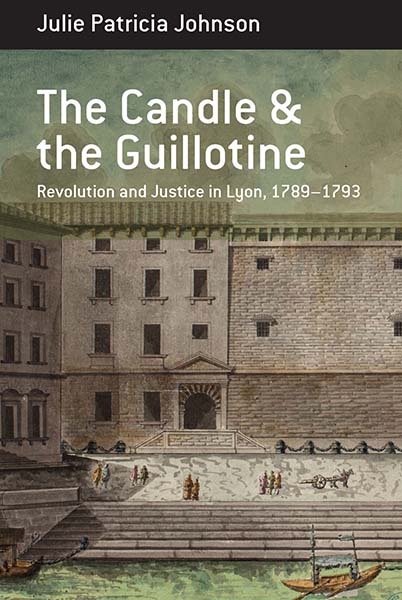
Julie Patricia Johnson is an associate researcher at the University of Melbourne. She is the author of The Candle and the Guillotine: Revolution and Justice in Lyon, 1789–93, published by Berghahn Books. She has presented her research at international conferences and has published work in journals such as French History and Lilith: A Feminist History Journal.
What drew you to study the French Revolution?
I must admit that it was Dickens who first introduced me to the French Revolution and it took some little while for me to realise how biased and unkind his representation of the sans-culottes (the poorer people who did not wear trousers) actually was. I gradually fell deeper and deeper into the spell of the period until I left my job and moved to Melbourne University from Sydney to study it further with Peter McPhee who I discovered had written a great book about Robespierre.
What aspect of writing this work did you find most difficult?
Framing the question for my Phd and this book, which grew from it, was difficult at first. I wanted to avoid being overly ambitious about what I might find in studying a justice (Ampère) who lived in Lyon during the Revolution but realised during a productive period at the archives that the considerably vaster area of the relationship of justice and revolution more generally needed to be addressed. For the book to make sense for a general audience I then also needed to contrast the history of Lyon with that of the more well-known city of Paris.
Do you think there are aspects of this work that will be controversial to other scholars working in the field?
I think the conclusions I came to about the involvement of elected justices in violent events will strike academic audiences as surprising rather than controversial.
What’s a talent or hobby you have that your colleagues would be surprised to learn about?
I love classical music and even played the cello for a while until I had to make a choice between typing and bowing. I can however still enjoy listening to musicians like Beethoven who lived at the same time as the people I have been studying.
If you weren’t a historian, what would you have done instead?
Music would have certainly been an alternative, whether singing or playing a stringed instrument.
To what extent do you think the book will contribute to debates amongst academics and activists within French History?
Understanding how people with similar ideas and aims at the beginning of the Revolution became so fatally divided as politics became increasingly factional is an issue that has intrigued many historians of the French Revolution. For some commentators the question of why so much violence was condoned by the revolutionaries (including the punishment of the hapless Lyonnais) is a fascinating one and I believe looking at the transformative changes to criminal justice during the revolutionary decade will help to clarify it. Recently there has been a recognition that even the Tribunal révolutionnaire – an exceptional court dealing with critical issues of counter-revolution and conspiracies after 1793 – began its operations within the new structure of courts and with some measures in place to help guarantee the rights of the accused. Despite the sharp escalation of guillotinings and the abandonment of many of these rights in the months of June and July 1794 ( after which period the court and its administrators themselves were called to account) the question of how a rule of law could be effected even in times of crisis was the subject of as much debate then as it is now. My book, with its focus on new material gleaned from the judicial archives of Lyon, adds to the discussion about how the institutions of revolutionary justice worked in practice and whether magistrates elected by the people were able to deliver promised rights or whether they too became embroiled in the fears and plots that threatened the Revolution itself.
How have studies on the French Revolution changed since you first were a scholar in the field? What is the most significant development?
I would have to say that the question of the ‘Terror’ with a capital ‘T’ has been a fascinating one. Once described as a deliberate and implacable policy used by radical Jacobins to punish those who disagreed with them it is now written with a lower case ‘t’ to acknowledge the fact that there was no one policy but instead times when repressive actions were thought to be justified and other times when violence was challenged and its use resisted. Some historians in the past have suggested it was the fear of conspiracies that led to violent measures. Others blamed the ‘circumstances’ of internal and external war. It seems that historians today aim for a wider and deeper understanding of lived experience. The language, thoughts and feelings of the time are appreciated as well as the dynamic and evolving nature of revolution itself.
Did any perceptions on the subject change from the time you started your research/compiled the contributions to the time you completed the volume?
When I first started my research there were a number of new strands of historical inquiry dealing with the Revolution, including the study of emotions and analyses of states which used the tools of ‘terror’. It is now well recognised that emotions of different periods and the language used to express those emotions are an important part of the context of the study of the French Revolution and thus do need to be understood. Looking to the French Revolution for the genesis of policies of ‘terror’ or terrorism in the modern world has however not been so useful because the meaning of the word itself has changed so much in the intervening period.
What is one particular area of interest or question, that hasn’t necessarily been the focus of much attention, which you feel is especially pertinent to your field today and in the future?
I think the experiences of women who were very active during the Revolution should be a focus of further study. While we do recognise some influential women there are many more voices, especially those of non-literary women, (the san-jupes who did not wear aristocratic dresses) who have struggled to be heard.
What did you like most about writing this book?
I loved the research. There were moments when I found astonishing things after a morning of finding nothing. The most surprising was a personal letter by the judge I was studying to another of his colleagues, preserved in the files of the Correctional court of which he was president. Although countless cases were probably missing in the archives, this letter started my quest to find out why the judges appeared to be in conflict. Why would the president of the court accuse the Director of the jury, his close working colleague, of ‘paralysing justice’? What situation had caused this to happen when the new laws were meant to be so clear and only had to be applied by the judges. Over 200 years after this letter was penned, the emotions of a time of crisis were so palpable.
What did you like least about writing the book?
I really did enjoy most stages of the process of writing. Perhaps the least favourite was tracking down references and ideas that I had earlier dismissed but then found out were important.
What do you hope that readers get out of this book?
This book does look at the Revolution from the point of view of Lyon rather than Paris and spends a bit of time comparing the lives of two people, Ampère and Chalier, who started out with similar aspirations but ended up at polar extremes. I hope by looking at a history of the Revolution from this unfamiliar angle readers get a better understanding of how difficult it was to navigate a very confusing but pivotal time. I wanted to convey the influences and ideas that excited people, their hopes, their fears and their concerns and the impossibility of knowing at that intimate level what was going to happen.
What is your favorite book in your discipline?
Timothy Tackett The flight of the king is a beautifully written narrative of an important episode of the Revolution and showed me that good writing is as much a part of writing history as good scholarship. Peter McPhee’s biography of Robespierre also really showed me the possibilities of biography as a genre and that to understand the young idealistic lawyer from his early education and his earliest legal cases to his personal relationships at the end of his life was to understand the larger picture of the progress of the Revolution.
New from Berghahn Books!
THE CANDLE AND THE GUILLOTINE
Revolution and Justice in Lyon, 1789–93
Julie Patricia Johnson
Vol. 17, BERGHAHN MONOGRAPHS IN FRENCH STUDIES
As in a number of France’s major cities, civil war erupted in Lyon in the summer of 1793, ultimately leading to a siege of the city and a wave of mass executions. Using Lyon as a lens for understanding the politics of revolutionary France, this book reveals the widespread enthusiasm for judicial change in Lyon at the time of the Revolution, as well as the conflicts that ensued between elected magistrates in the face of radical democratization. Julie Patricia Johnson’s investigation of these developments during the bloodiest years of the Revolution offers powerful insights into the passions and the struggles of ordinary people during an extraordinary time.

